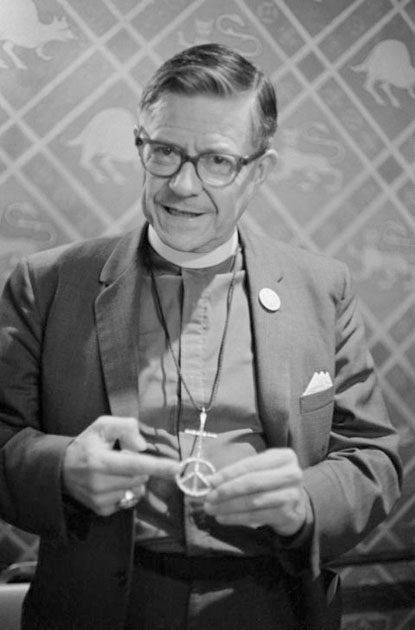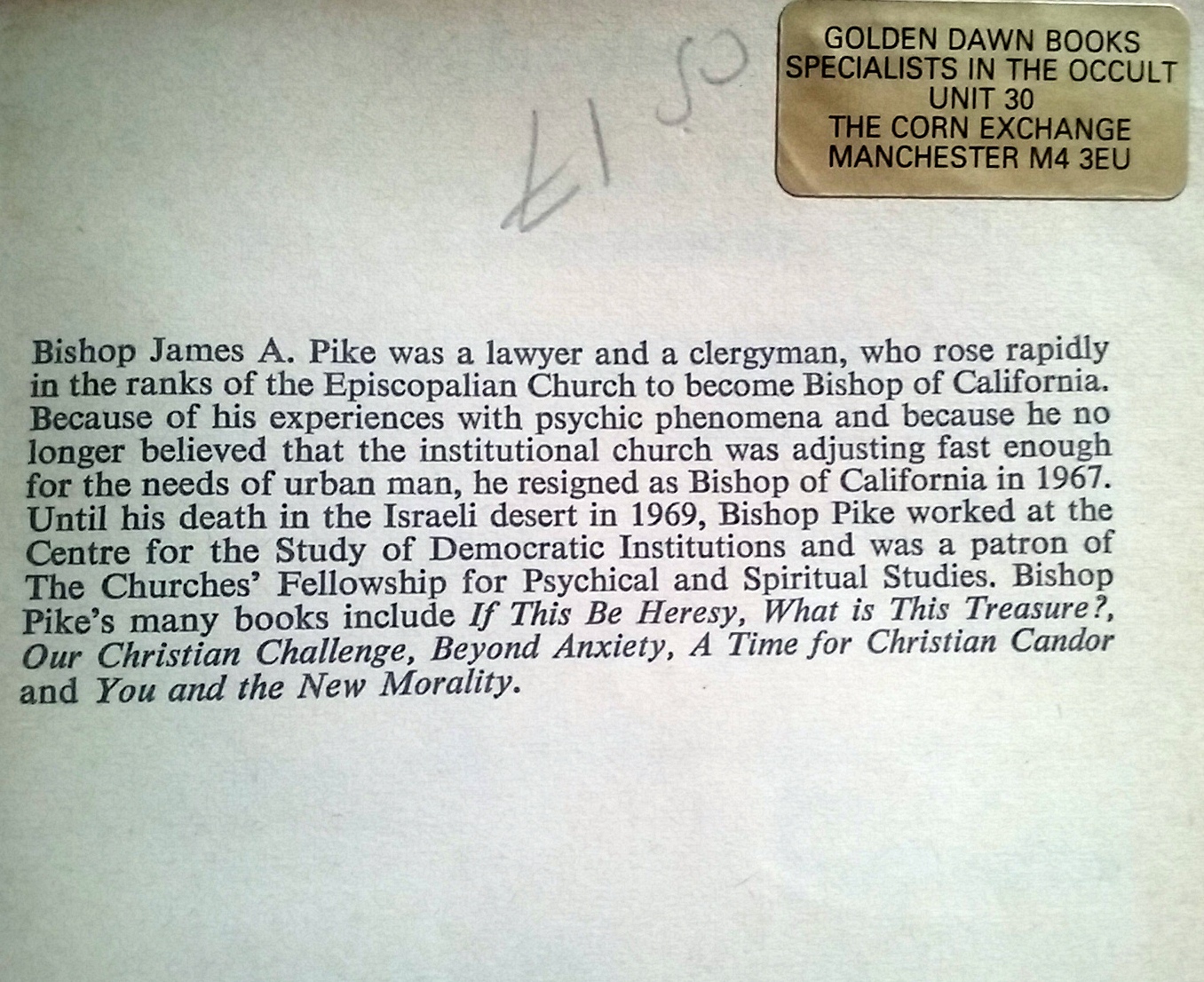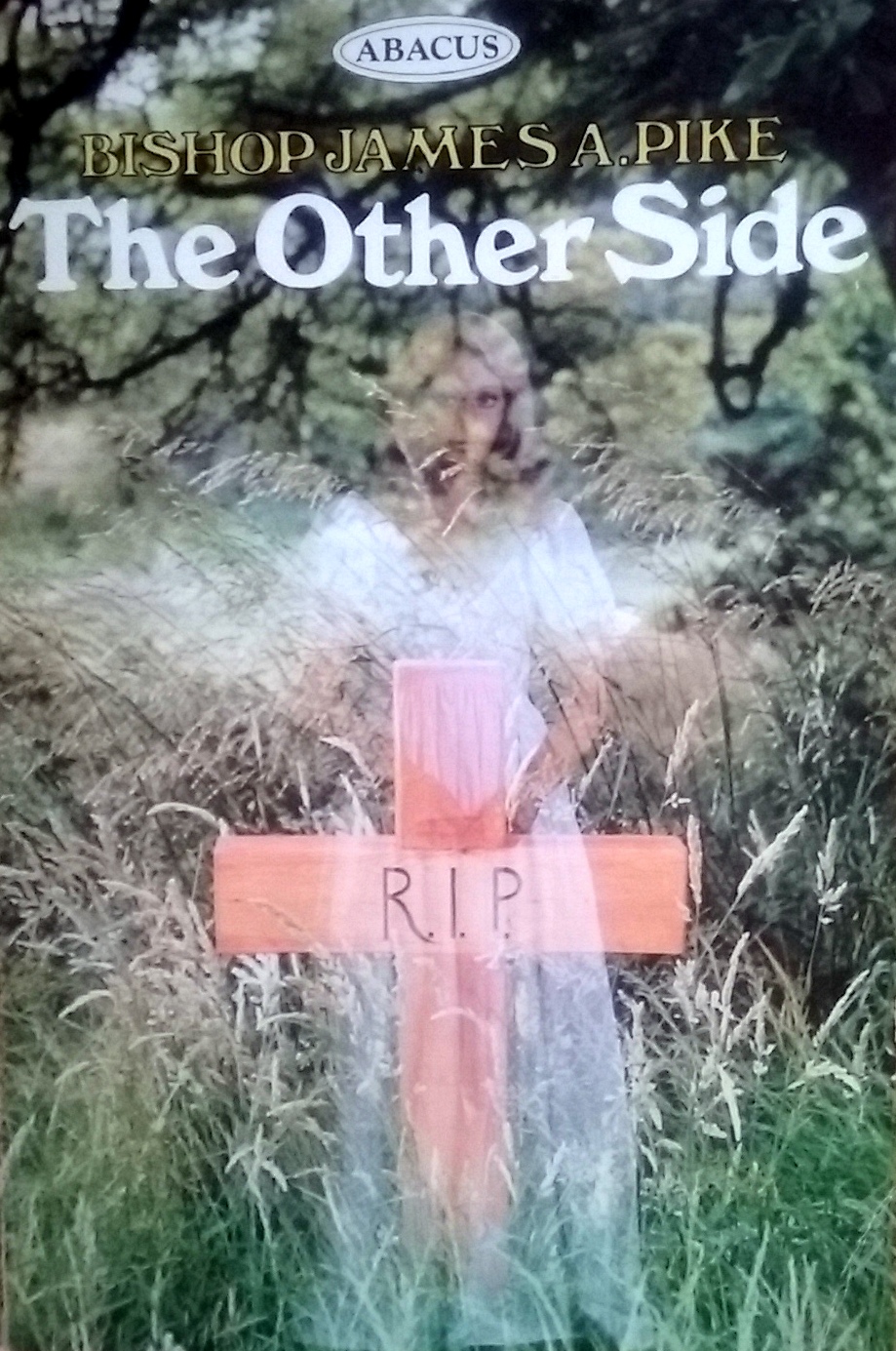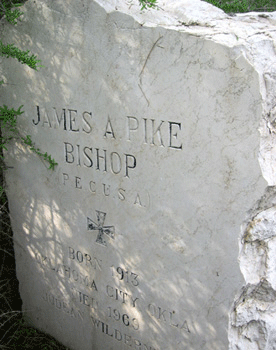Bishop James Pike: “The Blasphemous Bishop From Near Berkeley”

“Pike proudly displays the broken blasphemous sign, the so-called “peace symbol”
on his pectoral cross”
Forty-six years ago this month, on September 9th, 1969, the controversial American Episcopal bishop, James Pike, journeyed into the remote desert in Israel, accompanied by his third wife; he was never to return alive.
Today, he is an almost forgotten man. Yet in his day, in the so-called “swinging sixties” he was everywhere in the media, as well as in attendance at peace rally demonstrations when not thundering from his San Francisco pulpit. A man of intense energy, it seems.
An incidental footnote that I found interesting was in the controversial Sam Peckinpah film The Wild Bunch. The hero of the movie was the late William Holden, and his screen name was “Pike Bishop.” So, was the director having a dig at the bishop? Who knows! And for jazz buffs, the legendary Duke Ellington orchestra performed a concert of the Duke’s own sacred music at Grace Cathedral, September 26th this year is the 50th anniversary of that musical event.
Just recently, I was offered a complimentary copy of Pike’s 1969 book The Other Side, or to give its full title, An Account of My Experiences with Psychic Phenomena, and looking inside, I saw it was sold in a shop that “specialises in the occult.” Um, well, that should give the uninitiated some idea of the book’s theme and a glimpse of the ideas of this apostate bishop.

Pike was born in 1913 in Oklahoma. His parents were Roman Catholic but his father died when he was two. Young Pike was a pious and devout little boy, frequently serving mass as an altar boy. In fact, the only male models in his life were the priests of the local church he attended. They were tall men in cassocks; it must have impressed the little boy as he looked up to these men with respect and prayer. He even thought he had a priestly “vocation” himself, but it was not to be. Some years later, he would call himself “agnostic.”
A journey from devotion to doubt, it seems, for the enquiring Jim Pike.
During World War II, Pike served in the Navy, in naval intelligence, in fact. After getting a degree from Yale, he decided to become a priest himself in the Episcopalian church and was ordained in 1946. He seems to have moved quickly through the ecclesiastical ranks, becoming dean in 1952 and later, the bishop in California, a post he would hold until his resignation in 1966 after frequent clergy infighting. He offered himself as a freelance religious bishop/pundit.
As regards his theology, he seems to have had a problem with, amongst other things, the glorious Second Coming of the Lord Jesus Christ, the Virgin Birth, the Trinity, and what he called the “myth of the Garden of Eden.” But he had no problem, it seems, in promoting the role of women deacons (before it was fashionable, of course). In the last three years of his paid ministry, and always media savvy, of course, he would lecture on civil rights, abortion, capital punishment, married clergy, and always taking an anti-Vietnam approach.
One nickname referred to him as the hippies’ “favourite bishop.”
He did not support the 1960 presidential candidacy of JFK, citing the Catholic connection, for some reason (no ecumenical love there, it seems). He would also author over 20 books and be seen sporting the blasphemous broken-cross symbol attached to his pectoral cross, no less (see picture at top). The problem seems to have been that so many who tuned in to watch him perform on black-and-white television screens thought that he spoke for all Episcopalian bishops (he didn’t, of course). I also suggest that most of his fellow clergy were jealous of his ease with the media, which offered him a unique opportunity to air his controversial and heretical views on anything that caught his imagination.
Pike had always, it seems, been addicted to heavy smoking and alcohol consumption, and may have dabbled with common varieties of drugs then freely sought after in California.
Yet he seems to have been tortured by his faith or lack of it, rather than his faith removing the spiritual suffering that seemed to plague him for most of his years.
Men who are rather like Pike and others seem to dismiss the promise that, “He that hath the Son hath life; and he that hath not the Son of God hath not life” (1 John 5:12). Simple, isn’t it, of course? Plus you don’t need a degree in theology, archaeology or terminology either to understand or learn it.
The Lord Jesus Christ instructed Nicodemus that, “Ye must be born again” (John 3:7). We at this ministry are simple born-again Bible-believing Christians working in the fields of the unsaved by distributing Bible tracts, Holy Bibles, DVDs, and through the shortwave radio waves bringing, “The word to the world.” (This is our radio slogan for those that don’t know).
But it was to be the tragic suicide of Pike’s son Jim in 1966 that seems to have dented his frail faith. After all, he had barely been expelled from his church, so I can comprehend that the man was in pain, and with Jim’s death, that pain would be magnified into anger and doubt about whatever else he believed in. His Christian faith, if any, would now be replaced by an interest in the paranormal and what it could offer him in his quest to communicate with his departed son. However, strange paranormal events began occurring in his home soon after Jim’s death. Many are still unexplained, yet they can only be the work of familiar unclean spirits ready to control and confuse those who seek an answer about the afterlife but fail to seek truth in the word of God.
It’s difficult to imagine that people ever listened to or cared what these bishops expostulated or explained or what their religion promised or taught, but people once did. Many listened to Pike and heard his take on so many controversial subjects that came across his desk.
One wonders who reads bishop’s letters or papal encyclicals. In fact, does anyone really care? But I guess the show of organised religion has to stagger on. Yet Pike was in the advance army of reformed apostate Christendom eagerly following the pagan edicts from Vatican II as they spilled out from Rome from the council of that Luciferian and grand master of the broken cross, Angelo Roncalli, aka Pope John XXIII.
Yet Jim Pike was much more than a serving foot soldier of the left, but rather a paid-up self-appointed captain of the “American revolution” then sweeping the 1960s in the religious and political arenas. He also had a growing army of followers marching behind him, but not all religious of course. Most got swept up in that purple haze of pot, politics, and plenty of passion. They were strange times indeed that brought out that terrible genie to be unleashed with anger from that milky Satanic bottle. When the damage was done, it would never be put back or re-corked into the bottle.
Pike would and could deliver angry thundering political propaganda from his chosen cathedral pulpit, but the unique and precious gift of the sacred and divine blood of the Lord Jesus Christ and its lasting salvation for the sinner seems to always have eluded him. Was his heart hardened through doubt and despair? Well, it seems so from reading extracts from his book.
Anxiety and depression had seen the bishop’s son, also called Jim, end his own life by means of a handgun in a hotel room in Manhattan. Then, as now, the stigma of suicide still swirls around the deceased victim’s family, with many asking for years afterwards, how and why did their loved one’s final decision never come to light. In fact, it is said, “Suicidal people are made not born.” Apparently, 18-20 teenagers commit suicide in North America every day, and another 1,000+ attempt to do so; many due to loneliness, mental, emotional and/or sexual abuse, and no doubt demon possession too.
Yet Jesus said: “I am come that they might have life, and that they might have it more abundantly” (John 10:10). Spiritual separation from God is a slow death unless the person seeks repentance, for without Christ all are spiritually dead and sadly forever lost in Hell. Perhaps we all know many who fit this description.
A fool once wrote that, “Suicide is painless.” Well, I disagree. Some years ago, a dear friend of mine committed suicide over a broken engagement by swallowing some sort of bleach or poison. I viewed his body hours after his death after a phone call from his shocked mother, and I still recall his twisted face locked in horror, with his lips peeled back in fear at what he had done, and his hands were like claws reaching out for help that never arrived for him. Forty years later, I can still see his pleading face. I frequently speculate what went through his confused mind in those final minutes as his short life slowly ebbed away. For my late friend in distress, it certainly wasn’t painless.
Another friend was found dead some years later after falling out of a high-rise window. I never knew why or how that happened to him, and still, don’t.
But what of the terrible mass suicides of the young deluded followers of the manic cult leader and self-appointed (false) prophet, Jim Jones, who in 1978, in the so-called “Peoples Temple” also perished with his followers? Were their deaths painless? I doubt it, and for their families that pain still persists today.
Most tragic suicides, it seems, are committed by wealthy men and women, and less frequently by those surviving or living on the so-called skid row, according to comments made some years ago by an American sheriff to an American preacher. How right he was about this sad fact.
The two most famous suicides in the Bible are Samson and Judas Iscariot.
As I write this now, it is “World Suicide Prevention Day,” a new one on me. It seems appropriate that this painful subject should be aired because it does seem to be frequently swept under the carpet of public discussion or opinion. In fact, in a recent poll, over 50% called for more assisted-suicide clinics to operate in England. I do perhaps wonder who would assist in helping these poor souls towards their death? Sounds rather like eugenics to me, but by another more polite name. All very dangerous, with governments playing God and never really solving the problem because they are unable to until God establishes His earthly kingdom over this fallen world. (Can’t be long now we hope.)
The book
Back to the book: the first thing I noticed from the laminated cover was the ghostly image of a young, perhaps deceased, girl, plus a personal dedication inside to the bishop’s deceased son, Jim.

Published in 1969, the book details how Pike’s journey into the occult was initiated from the suicide of his son, and it’s really weird as he explains the strange phenomenal happenings that occurred in his home over a long period. Very spooky, but of course, it’s the occult again. I do wonder if he prayed for spiritual deliverance from the attacks upon him in his home.
Pike spent frequent periods with his son, Jim Jr., in England on sabbaticals and other church-related matters. In his personal search for a “friendly medium” to try and connect with his late son, he chose the Church of England as a go-between. And why not? They had never been ambiguous on where they stood on spiritualism and the paranormal. He seems to have laboured under the misapprehension of doubts fuelled by alcohol and assorted drug intake, always a dangerous cocktail in substance abuse. And did he really spend 4 years in intensive psychoanalysis as some have stated?
In 1937 Pike writes, “The archbishops of York and Canterbury appointed a committee to investigate spiritualist interest, which was more widespread in England than it is here.” The final published report was suppressed for nine years for some reason and I’m not sure by who, maybe the monarch at the time, the late king being the head of the Anglican Church. Finally, in some mysterious way, a copy of the majority report appeared on the desk of the editor of the weekly Psychic News, and it seems that its pages contained a favourable report in support of “spirit communication” and other dangerous avenues in reaching the dead and communicating with fallen familiar spirits.
The bishop was not only getting messages and reports back from Jim Jr. (via the medium/unclean spirits, of course), but even from the bishop’s former mistress, Maren, who committed suicide in bishop Pike’s apartment. It seems that he discovered her body in his apartment, then quickly removed it to her apartment. He would later lie to the police about this, but not before conducting her funeral service with ease.
In his book, he claims on page 252 that he was able to communicate with her (or “something”) through the medium about her final minutes before she died from the overdose she swallowed. She then informs him rather mysteriously that, “I am going to see Jesus someday.” Only those born again will see Jesus, the King of kings. That’s why you need to be saved to receive eternal life now, and not when you die!
The bishop, now perplexed, wrote, “Maren had not been a great believer in Jesus.” “Do you hear about him?” he asked curiously. She replied: “No, he’s just another person, (he’s) been here longer.”
Later he asks his son Jim on page 173, “Have you by now heard anything about Jesus?” It seems he was now searching for answers from his dead son, and the news he received was not good.
Jim (“something” else on the other side) informed the searching and frightened bishop that, “I haven’t heard anything personally about Jesus. Nobody around me seems to talk about him.”
Later in the book Jesus is described in an oblique way by the bishop as being the Son of God, a prophet, and a teacher. Even unclean spirits in the New Testament were forced to tell the truth about Jesus. Maybe on this occasion, one devil was forced by God to confess this truth.
In the last month of his life, I believe the bishop was on a personal mission of faith to seek the comfort of Jesus Christ.
In August 1969, the year of the moon landing, the bishop was accompanied by his third and younger wife on a trip to Israel, perhaps hoping to rekindle his faltering frail faith. Perhaps he thought the arid Sinai Desert would do this, or perhaps that divine inspiration or guidance would also be discovered in the region where the Dead Sea scrolls had been located in 1946 by a Bedouin shepherd boy. Who knows? I also believe this tormented and grieving bishop was now on a mission. It would be his last journey. And where more appropriate for him to search than in the Holy Land, following in the footsteps of the Master?
After entering the spiritual wilderness of that land in their hired car, the Pikes somehow took a wrong turn. They had hoped to reach Jericho by nightfall; instead, the car entered a marshy track and became bogged down in the mire. Now they were unable to move, and may also have had a slow puncture. Foolishly, they had come unprepared for the cruelty of the desert, bringing little water or other survival accoutrements. After a two-hour hike (leaving the car and seeking immediate help), the bishop was unable to proceed any further. He must have been exhausted. It was then decided that Diana Pike would leave her husband and seek help; she was never to see him alive again.
Pike was big news on the world’s media. Search parties went out to find Jim Pike but all returned in vain. Amazingly, several mediums and seers offered their false help to the Israeli authorities, with one even claiming that the wounded bishop lay in a cave, but after an intensive search, the bishop was finally found dead.

He had fallen or stumbled down a steep 70-feet crescent. Some later claimed he was discovered on his knees, others claimed this was not so.
Mrs Pike would later explain: “We tried to follow in Jesus’ footsteps. We wanted to see the conditions Jesus knew. It was our first time in the desert. We didn’t take a guide. We were very stupid about that.”
Well, that’s an honest response, I suggest.
There would be a solemn Episcopal requiem mass said for him in the presence of his three wives (I imagine that doesn’t happen too often). Incidentally, masses of any sort or colour can save no one; they are totally useless, and unscriptural.
The bishop’s blasphemous journey into Ouija boards and séances was foolish and dangerous. Always remember, the Holy Bible is very clear about this! Do not EVER touch or experiment!
Through his teachings, Pike would also cast a spell that later ushered a variety of simmering religious cocktails, as well as the curses of ecumenism and inter-faith relations that bind all counterfeit religions together, a terrible thing.
But we should not be surprised. In these Laodicean times, we all live in, there is great revelry in all manner of things that ought to be soundly repelled! Such things are antichrist and antichristian. It seems to me that bishop Pike, a man whose persona I found difficult to understand, certainly had an evil agenda that targeted the tenets of Christianity. Did this venom reach the Muslim, Buddhist, and Hindu faiths as well? Or was he just more selective against Christianity? Even when he eventually departed from the Episcopalian church, he still rejoiced in using the fancy title of “bishop” and I suspect a lucrative financial retirement package was also arranged for him before he bowed out of the California scene. I’m also sure that the bishop would have had no time for us at all here at Ex-Catholics For Christ, or for our distaste for organised religion, the one-man ministry, or paid clergy. This would certainly grate with him, I expect.
So, get a job, guys! McDonald’s are always recruiting!
In conclusion, the paranormal still remains incredibly dangerous, even more so today, I suggest, with the Internet and 24-hour satellite television. Such remains strictly forbidden, of course, in the Holy Bible (Lev. 20:6; Deut. 7:26), and of course Rev. 22:8; 22:13. What more is needed by people who foolishly dabble in the occult, divination, card reading, Ouija boards, astrology addiction, etc.? How bishop Pike conveniently missed all of this as he foolishly walked into these satanic traps, I do not know. Maybe it was because of his reliance on alcohol. Maybe other substances. Maybe it was through the suicide of his son Jim and later his mistress that his mind had gone into meltdown. Maybe it was through arrogance, and maybe through anger, we just do not know. But if any of these were the reasons, then he should have sought peace through the Lord Jesus Christ’s finished work on the cross (Matthew 11:28; John 6.37). Isaiah 40:8: “The grass withereth, the flower fadeth, but the word of our God shall stand forever.” Amen to that.
There is no other way, and if the bishop missed this opportunity, then make sure you don’t.
“It is appointed unto men once to die, but after this the judgment!” (Hebrews 9:27).
Reference
The Other Side, Bishop James A. Pike
GPB
(All Rights Reserved)
September 2015